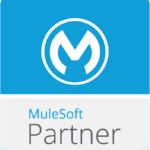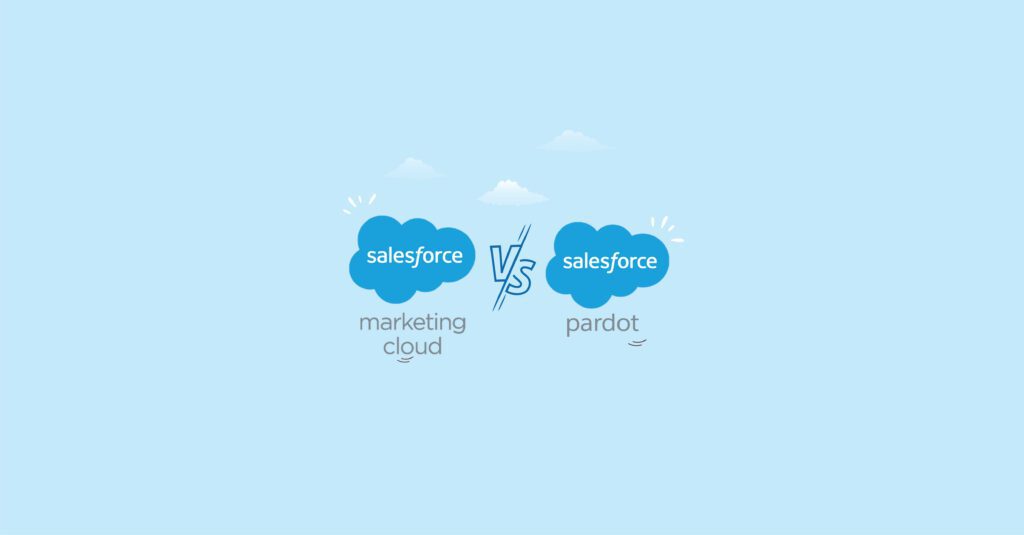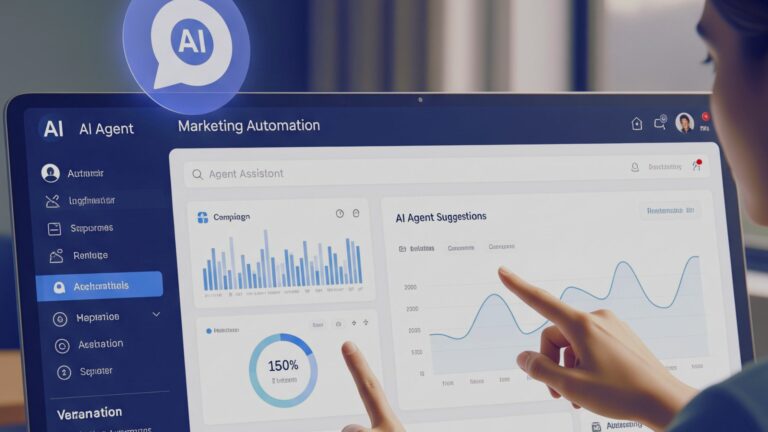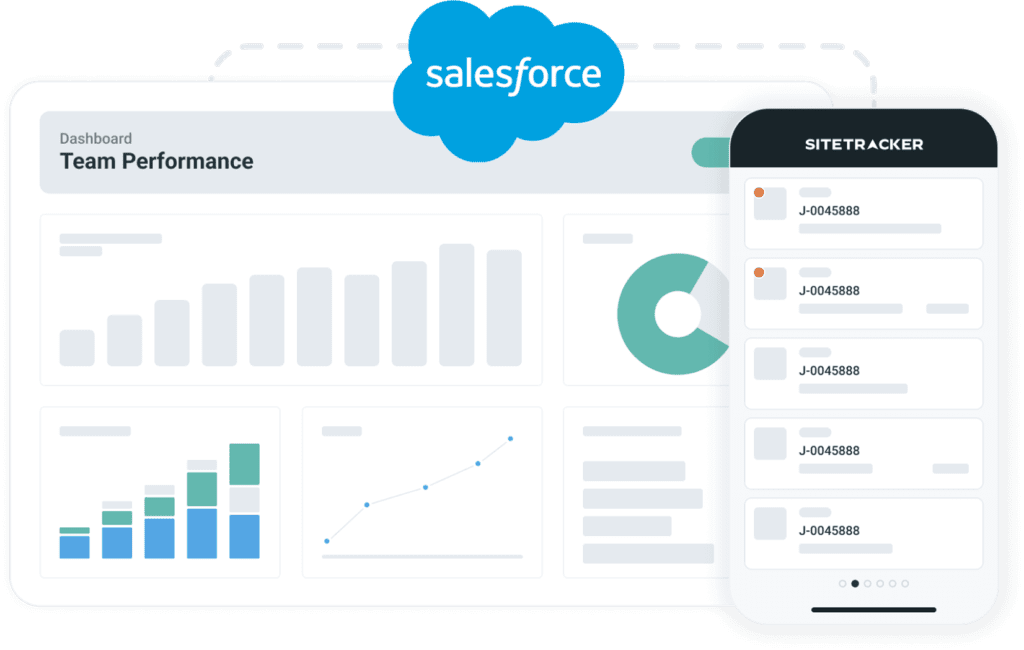In this article, we’ll go over the differences between Pardot and Salesforce Marketing Cloud and provide an overview of the features each one offers. And what to consider when deciding which one is right for your business. With a better understanding of both platforms, you’ll be able to make an informed decision on which one best fits your needs.
Content:
Pardot vs Marketing Cloud
| Pardot | Marketing Cloud | |
| Industry | Market Segment: B2B | Market Segment: B2C |
| Features: key features | Lead Generation, Scoring, and Grading | Rewards Management |
| Lead Nurturing | Subscriber Preference Management | |
| Email Marketing | Content Management and Workflows | |
| Campaigns Management | Social Listening and Analysis | |
| Marketing Reporting | Digital Advertising Management | |
| Email Marketing/Sales/Marketing Alignment | Email Studio: | |
| Pardot’s landing page builder | Email Marketing. | |
| Pardot integrates search engine marketing. | Mobile Studio: | |
| Journey Builder | Mobile Messaging. | |
| Lead management: | Social Studio: | |
| Lead Scoring. | Social media marketing. | |
| Lead Nurturing. | Advertising Studio: | |
| Lead Generation. | Digital Advertising. | |
| Accurate analytics and attribute tools | Web Studio. | |
| Critical personalisation capabilities. | Interaction Studio. | |
| Add-Ons: | Salesforce Engage | Tableau CRM for Loyalty Management |
| B2B Marketing Analytics Plus | Einstein Vision for Social Studio | |
| Engagement History Dashboards | Ascendix Search |
Pardot vs marketing cloud is a common debate among sales and marketing professionals. Both platforms offer a variety of features and benefits, so it can be tough to decide which one is right for your business. Here’s a quick rundown of the main differences between Pardot and the marketing cloud:
Pardot is a sales acceleration platform that helps you close more deals by automating your sales process. It includes features like lead nurturing, lead scoring, and email tracking.
Marketing Cloud is a CRM platform that helps you manage your customer data and interactions. It includes features like contact management, a journey builder, and Einstein Analytics.
Introduction
Read More: Pardot Renamed “Marketing Cloud Account Engagement”—Why?
The marketing landscape is constantly changing and evolving, and digital marketing has become an integral part of any successful marketing strategy.
For marketers looking to capitalise on digital marketing, two of the most popular platforms to consider are Pardot and Salesforce Marketing Cloud.
Both of these systems offer a variety of features and capabilities that can help improve marketing ROI, but there are some key differences between them to consider.
Pardot vs Salesforce Marketing Cloud – Key differences
Pardot and Salesforce Marketing Cloud are both powerful marketing automation tools, but they serve different purposes.
- The key difference between the two is that Pardot focuses mainly on B2B marketing, while Salesforce Marketing Cloud focuses on larger-scale B2C marketing.
- Pardot is designed to integrate with Salesforce CRM and Sales Cloud, while Marketing Cloud is built to be an all-in-one platform across the customer experience.
- Pardot offers email automation, lead scoring, and segmentation, while Salesforce Marketing Cloud provides AI-driven insights, personalised campaigns, and cross-channel customer journeys.
- Pardot is also an easier platform to use, while Salesforce Marketing Cloud is more complex and takes longer to learn. Ultimately, the best platform to choose will depend on the specific needs of your business.
- Pardot was built to help companies build relationships with their customers and prospects, while Salesforce Marketing Cloud focuses on helping them reach their target audience with personalised messages.
- Pardot is best for small to midsized businesses, providing a comprehensive suite of marketing automation capabilities. Salesforce Marketing Cloud is a great choice for large businesses, offering an extensive set of data management, segmentation, and personalisation capabilities.
- Pardot has a simpler interface, making it easier for users with limited technical knowledge to get up and running quickly. Meanwhile, Salesforce Marketing Cloud offers more complex data management and reporting capabilities, allowing businesses to dig deeper.
B2B vs B2C – The common differentiation in Salesforce Marketing Cloud and Pardot
If you’re looking for marketing automation, the best choice for business-to-business interactions is Pardot, while the best choice for business-to-consumer interactions is Salesforce Marketing Cloud.
This is partly true. As a B2B marketing platform, Pardot excels at things like lead management and automation, marketing and sales alignment, and marketing campaigns.
But Marketing Cloud adds to what can be done with advertising on social media and SMS campaigns. When B2C brands use social or transactional one-to-one mobile messaging, they naturally put more resources into these kinds of projects.
Most businesses that sell to other businesses use Marketing Cloud, but there’s no rule that says businesses that sell to consumers can’t use Pardot.
Either choice could work for your business, depending on things like the size of your database, the digital marketing channels you use, and the goals you have set for the automation software.
Marketing Cloud for mobile messaging and social media
The Marketing Cloud is a powerful tool that enables companies to manage their mobile messaging and social media campaigns with ease. With its suite of modules, it provides users with a comprehensive set of features to optimise and improve their marketing initiatives. Its mobile messaging module provides the ability to send personalised text messages to customers, while its social media module helps marketers engage their target audience with relevant, timely social content. The platform also comes with an analytics suite that can be used to measure the success of campaigns and gain insights into customer behaviour. Marketing Cloud is the perfect tool for companies to effectively manage their mobile messaging and social media initiatives.
Pardot – for lead management and long-term nurture
Pardot is a powerful digital marketing and automation platform that makes it easy to manage leads and nurture relationships. It enables users to create automated campaigns, segment and score leads, and generate meaningful insights for better decision-making. With its intuitive interface and powerful features, Pardot is an ideal solution for businesses looking to manage leads, develop long-term relationships, and maximise their return on investment. Additionally, Pardot’s integration with CRM systems such as Salesforce and Microsoft Dynamics makes it easy to build and maintain customer databases, track customer engagement, and measure the efficacy of campaigns. Pardot’s comprehensive suite of tools ensures that businesses have the tools they need to drive customer acquisition and loyalty.
Which is right for your business?
“So, which platform should you choose? It really depends on your business needs. If you’re focused on closing more deals, then Pardot may be the better choice.
If you’re more concerned with managing customer relationships, then the marketing cloud may be a better fit.”
Can you use both Salesforce Marketing Cloud and Pardot?
The answer is yes!
Think about a few things first if you want your business to use both Pardot and Marketing Cloud.
1) Cost: It will cost more to use both Pardot and Marketing Cloud than to use just one of them. If you don’t know which tool is best for your business, start with one and see how it works before adding another.
2) Integration: Both Pardot and Marketing Cloud have ways to connect, but they aren’t perfect. If you want to get the most out of these two tools, you should either hire a company that specialises in integration or do it yourself.
How can Salesforce Marketing automation help your business?
- Salesforce Marketing Cloud is a complete marketing and analytics platform that lets you automate, personalise, and measure your digital marketing campaigns. You can run all of your marketing activities on a single, integrated platform.
- Managing time is one of the hardest things for any company to do. This is where it saves your company time and money.
- It helps to analyse marketing campaigns so that the return on investment can be measured and kept track of. You can also use the data to figure out which campaigns are working well and how to improve the ones that aren’t.
- It’s simple to run targeted ads based on user behaviour.
- Marketing automation lets you stay in touch with your current and potential customers by sending them the right message at the right time and through the right channel. This will increase your chances of re-engaging them and achieving a favourable outcome.
- Creating marketing campaigns that are dynamic, personalised across channels, and stand out from the crowd
What is Pardot?
Pardot is a marketing automation software that helps companies attract, nurture, and close more prospects. It’s designed to create more efficient marketing processes by automating tasks like email marketing, lead generation, lead scoring, and nurturing. Pardot also provides insights into how your marketing campaigns are performing, so you can make adjustments on the fly.
Pardot add-on Product’s
- Salesforce Engage,
- B2B Marketing Analytics Plus,
- Engagement History Dashboards
What is Salesforce Marketing Cloud?
Salesforce Marketing Cloud is a cloud-based marketing automation platform. It helps companies automate and measure their marketing campaigns, including email, social media, digital advertising, and more. With Marketing Cloud, businesses can use data from Salesforce CRM and other sources to create targeted marketing campaigns.
They can then measure the results of these campaigns to improve future performance. The Marketing Cloud provides businesses with a powerful set of tools to drive more efficient marketing campaigns.
In addition, it integrates with Salesforce CRM to provide businesses with a complete view of their customers.
Click here to learn more about salesforce marketing cloud: features and benefits of using it.
Salesforce Marketing Cloud add-ons
- Tableau CRM for Loyalty Management
- Einstein Vision for Social Studio
- Ascendix Search
Marketing Cloud key features
- Email Studio:
- Email Marketing.
- Mobile Studio:
- Mobile Messaging.
- Social Studio:
- Social media marketing.
- Advertising Studio:
- Digital Advertising.
- Web Studio.
- Interaction Studio.
Pardot key features
- Email Marketing.
- Pardot’s landing page builder
- Pardot integrates search engine marketing.
- Journey Builder.
- Lead management:
- Lead Scoring.
- Lead Nurturing.
- Lead Generation.
- Accurate analytics and attribute tools
- Critical personalisation capabilities.
- Sales/Marketing Alignment.
Key takeaway
- Pardot and Marketing Cloud help businesses plan, run, and measure their marketing campaigns by keeping track of all the metrics they need to do so.
- Both have a core set of features, like generating leads and keeping track of sales conversions, so they are used by the same people.
- If you need more, Marketing Cloud is a better choice than Pardot because it has more advanced features that Pardot doesn’t have. Remember that it depends on the needs of the business.
- If you want your business to use both Pardot and Marketing Cloud, you should first think about how much they will cost and how well they will work together.
- Pardot might be a better choice if you want to close more deals and also do B2B.
- If you care more about managing customer relationships, the marketing cloud might be a better fit.
- Cloud Odyssey is a Salesforce partner that helps people get the most out of their Pardot or Marketing Cloud accounts.
FAQ
What is the difference between Pardot and the marketing cloud?
The difference between Pardot and Marketing Cloud is that Pardot specialises in creating landing pages, lead nurturing campaigns, and email automation, while Marketing Cloud offers more robust marketing tools such as the ability to create customer personas, conduct market research, track social media conversations, and create visual content like infographics and videos.
For example, if you wanted to use LinkedIn advertising in your marketing automation system, Pardot doesn’t offer that functionality.










